陕师大2012英语专业考研专业课真题(含二外与基础英语)(回忆版)
西安外国语大学考研真题—西安外国语学院试题目录清单
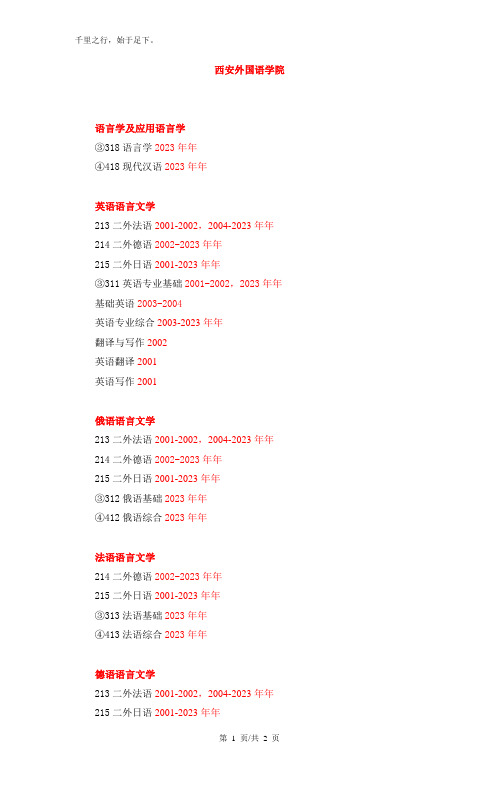
西安外国语学院语言学及应用语言学③318语言学2023年年④418现代汉语2023年年英语语言文学213二外法语2001-2002,2004-2023年年214二外德语2002-2023年年215二外日语2001-2023年年③311英语专业基础2001-2002,2023年年基础英语2003-2004英语专业综合2003-2023年年翻译与写作2002英语翻译2001英语写作2001俄语语言文学213二外法语2001-2002,2004-2023年年214二外德语2002-2023年年215二外日语2001-2023年年③312俄语基础2023年年④412俄语综合2023年年法语语言文学214二外德语2002-2023年年215二外日语2001-2023年年③313法语基础2023年年④413法语综合2023年年德语语言文学213二外法语2001-2002,2004-2023年年215二外日语2001-2023年年第 1 页/共 2 页③314基础德语2023年年④414德语综合(含翻译与写作)2023年年日语语言文学213二外法语2001-2002,2004-2023年年214二外德语2002-2023年年③315日语基础2023年年④415日语综合(含日语翻译与写作)2023年年外国语言学及应用语言学213二外法语2001-2002,2004-2023年年214二外德语2002-2023年年215二外日语2001-2023年年③311英语专业基础2001-2002,2023年年基础英语2003-2004英语专业综合2003-2023年年④422英语专业综合(商务英语方向)2004-2023年年(2004有答案)翻译与写作2002英语翻译2001英语写作2001人文地理学③317区域经济学2023年年④417综合考试(含人文地理学概论、旅游地理学、城市地理学)2023年年旅游管理③321管理学原理2023年年④421综合考试(含旅游学概论、旅游经济学、中国历史文化)2023年年。
陕西师范大学研究生网络课程英语考试答案

陕西师范大学研究生网络课程英语考试答案第一篇:陕西师范大学研究生网络课程英语考试答案翻译:1.The old gentleman grumbled about the law which was so favorable for criminals that judgement seemed like the game of chance.2.If we only stick to such austerity measures, our country will slide into further economic decline.3.The scientists all over the world have reached a consensus that the earth will be likely to become warm over the subsequent decades.4.They will denounce us to the police if we smite them down.5.We firmly object to extravagance and formalism.6.Politicians and the leaders of business circles often question why these unaccountable organizations have the right to do so.7.He said he had bad news to tell me, and I braced myself for it.8.She is so jealous that you should be wary of her making mischief between you.9.The police reassured her that her kid was completely safe.作文:As a teacher, I believe that I have the responsibility in the students’ growth from the following two aspects.First and foremost, I think as a biology teacher, I am supposed to teach all that I know about biology to my students without reservation.On one hand, I know I must prepare for my teaching carefully before class, because preparation for class is one of the most important procedures in teaching.On the other hand, I am patient with all the questions raised by my students to ensure their total understanding.In addition, I feel that a responsible teacher should care about not only students’ study but also their life.Are they happy or sad? Healthy or sick? I, their teacher as well as their friend, should keep an eye on their health, emotion andattitude.It’s my duty to help them build up a positive outlook on life, value and world.Correct their mistakes in time and lead them to the right course.Good grades are not the only judge of success.What our society needs, at first, is a healthy person, physically and mentally.As is mentioned above, based on these two aspects, I will try my best to make a difference in my students’ growth.第二篇:陕西师范大学研究生会部门简介[推荐]陕西师范大学研究生会2014年秋季纳新公告亲,当你踏入陕西师范大学这所梦想的学府,可曾想在这个新的平台上展翅翱翔?亲,当你面对崭新的环境,可否想过找一个温暖的大家庭,与一帮有着共同理想的青年朋友一道,为一个共同的梦想而打拼?陕西师范大学研究生会,愿意与你携手并行,为我们共同的梦想而奋斗,我们将以百倍的热情,欢迎你的到来!快呼唤你的小伙伴,一同加入我们吧!陕西师范大学研究生会现共有17个部门,分别介绍如下:长安校区研究生会办公室1.健全研究生会内部管理制度,配合主席团协调各部门工作;2.做好研究生会财务管理、物资采购和档案管理等工作;3.起草公文、制度、计划与总结,并以研究生会名义对外发布;4.做好会议准备与会议记录,协助主席团推进会议决定事项的实施;5.落实值班与信息报送工作,及时收集反映研究生的隐患安全问题;6.办理主席团交办的其他工作并为研究生会各部门工作提供服务。
陕师大2013英语专业考研专业课真题(含二外)(回忆版)
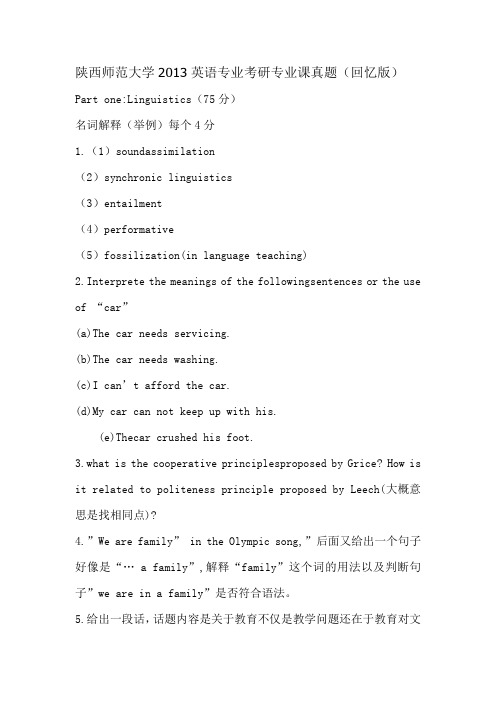
陕西师范大学2013英语专业考研专业课真题(回忆版)Part one:Linguistics(75分)名词解释(举例)每个4分1.(1)soundassimilation(2)synchronic linguistics(3)entailment(4)performative(5)fossilization(in language teaching)2.Interprete the meanings of the followingsentences or the use of “car”(a)The car needs servicing.(b)The car needs washing.(c)I can’t afford the car.(d)My car can not keep up with his.(e)Thecar crushed his foot.3.what is the cooperative principlesproposed by Grice? How is it related to politeness principle proposed by Leech(大概意思是找相同点)?4.”We are family” in the Olympic song,”后面又给出一个句子好像是“… a family”,解释“family”这个词的用法以及判断句子”we are in a family”是否符合语法。
5.给出一段话,话题内容是关于教育不仅是教学问题还在于教育对文化的作用之类的。
先把这段话翻译成汉语,然后结合内容写Comment. Part two:Literature(75分)1.名词解释(未按顺序每个2分)(1)naturalism(2)neoclassicism(3)Metaphysicalpoetry(4)Byronichero(5)Iceberg principle2.简答。
陕师大12级免费师范教育硕士英语答案
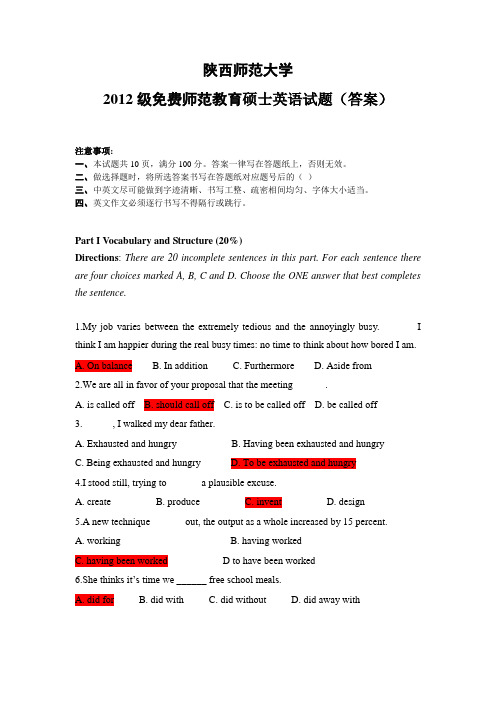
陕西师范大学2012级免费师范教育硕士英语试题(答案)注意事项:一、本试题共10页,满分100分。
答案一律写在答题纸上,否则无效。
二、做选择题时,将所选答案书写在答题纸对应题号后的()三、中英文尽可能做到字迹清晰、书写工整、疏密相间均匀、字体大小适当。
四、英文作文必须逐行书写不得隔行或跳行。
Part I Vocabulary and Structure (20%)Directions: There are 20 incomplete sentences in this part. For each sentence there are four choices marked A, B, C and D. Choose the ONE answer that best completes the sentence.1.My job varies between the extremely tedious and the annoyingly busy. ______ I think I am happier during the real busy times: no time to think about how bored I am.A. On balanceB. In additionC. FurthermoreD. Aside from2.We are all in favor of your proposal that the meeting ______.A. is called offB. should call offC. is to be called offD. be called off3.______, I walked my dear father.A. Exhausted and hungryB. Having been exhausted and hungryC. Being exhausted and hungryD. To be exhausted and hungry4.I stood still, trying to ______ a plausible excuse.A. createB. produceC. inventD. design5.A new technique ______ out, the output as a whole increased by 15 percent.A. workingB. having workedC. having been worked D to have been worked6.She thinks it‟s time we ______ free school meals.A. did forB. did withC. did withoutD. did away with7.He never regretted paying 300 Yuan for the bookcase. As a matter of fact he would gladly have paid ______ for it.A. as much twiceB. twice as muchC. much as twice D as twice much8.He was attending a meeting, ______ come to your birthday party then.A. unless he would haveB. or he wouldC. nevertheless he did not D or he would have9.He ______ the job ______ because it involved too much traveling.A. turned…downB. turned…awayC. turned off D turned…over10. They have made changes in their plans for a new science park as youA. suggestedB. have suggestedC. had suggestedD. suggest11.In some areas of northwest China, intensive farming has brought aboutsevere_____ of the land, which accounted for poor harvest in recent years.A. deforestationB. dejectionC. delectation D degeneration 12.The accuracy of scientific observations and calculations is always_____ the scientist‟s time-keeping methods.A. at the mercy ofB. in accordance with .C. under the guidance ofD. by means of13.Manufacturers raised the price of this product to ______ the increased cost of material.A. write offB. offsetC. make forD. abstain from14.Among other things was the discussion to reach a_______ trade agreement between the two countries.A. reciprocalB. mergedC. marketableD. mature15.Nowadays more Chinese would like to hold their reunion dinner in posh restaurants, despite the______ costs. They find it more enjoyable and physically less demanding.A. hyperbolicB. inexorableC. exorbitantD. protean16. Christmas is a Christian holy day usually celebrated on December 25th_______the birth of Jesus Christ.A. in accordance withB. in terms ofC. in favor ofD. in honor of17. The _________ to overthrow the revolutionary regime was unearthed andpromptly smashed.A. conspiracyB. trickC. intrigueD. plot18. In the last couple of days, a number of areas in China were hit by heavy snowfalls,powerful winds or suffocating sandstorms. The extremely bad weather has ________ the transportation system in the areas.A. constrainedB. cussedC. crippledD. chucked19. My father is researching the spread of AIDs. And he is ________ in hispresentation of experiments.A. relevantB. sacredC. proteanD. meticulous20. Mr. John made a very wonderful after-dinner speech. His ________ mind,graceful manner and fluent words moved all the participants deeply.A. awesomeB. articulateC. agileD. arbitraryPart II Reading Comprehension (40%)Directions: There are 4 passages in this part. Each passage is followed by five questions or unfinished statements. For each of them there are four choices marked A, B, C and D. You should decide on the best choice.Passage OneWhen your parents advise you to "get an education" in order to raise your income, they tell you only half the truth. What they really mean is to get just enough education to provide manpower for your society, but not so much that you prove an embarrassment to your society.Get a high school diploma, at least. Without that, you will be occupationally dead unless your name happens to be George Bernard Shaw or Thomas Alva Edison, and you can successfully dropout in grade school.Get a college degree, if possible. With a B.A., you are on the launching pad. Butnow you have to start to put on the brakes. If you go for a master's degree, make sure it is an M.B.A., and is famous.Do you know, for instance, that long-haul truck drivers earn more per year than full professors? Yes, the average 1977 salary for those truckers was $24000 while the full professors managed to earn just $23030.A Ph.D. is the highest degree you can get. Except for a few specialized fields such as physics or chemistry where the degree can quickly be turned to industrial or commercial purposes, if you pursue such a degree in any other field, you will face a dim future. There are more Ph.D.s unemployed or underemployed in this country than any other part of the world.If you become a doctor of philosophy in English or history or anthropology or political science or languages or worst of all in philosophy, you run the risk of becoming overeducated for our national demands. Not for our needs, mind you, but for our demands.Thousands of Ph.D.s are selling shoes, driving cars, waiting on table, and endlessly filling out applications month after month. They may also take a job in some high school or backwater college that pays much less than the janitor earns.You can equate the level of income with the level of education only so far. Far enough, that is, to make you useful to the gross national product, but not so far that nobody can turn much of a profit on you.21. According to the writer, what the society expects of education is to turn out peoplewho _____.A. will not be a disgrace to societyB. will become loyal citizensC. can take care of themselvesD. can meet the nation's demands as a sourceof manpower22. Many Ph.D.s are out of job because _____.A. they are improperly educatedB. they are of little commercial value to their societyC. there are fewer jobs in high schoolsD. they prefer easier jobs that make more money23. The nation is only interested in people _____.A. with diplomasB. who specialize in physics and chemistryC. who are valuable to the gross national productD. both A and C24. Which of the following is not true?______A. Bernard Shaw didn't finish high schools, nor did Edison.B. One must think carefully before pursuing a master degree.C. The higher your education level, the more money you will earn.D. If you are too well-educated, you'll be overeducated for society's demands.25. The writer sees education as _____.A. a means of providing job security and financial security and a means ofmeeting a country's demands for technical workersB. a way to broaden one's horizonsC. more important than finding a jobD. an opportunity that everyone should havePassage TwoIn the mid-nineteenth century, the United States had tremendous natural resources that could be exploited in order to develop heavy industry. Most of the raw materials that are valuable in the manufacture of machinery, transportation facilities, and consumer goods lay ready to be worked into wealth. Iron, coal, and oil —the basic ingredients of industrial growth —were plentiful and needed only the application of technical expertise, organizational skill, and labor.One crucial development in this movement toward industrialization was the growth of the railroads. The railway network expanded rapidly until the railroad map of the United States looked like a spider‟s web, with the steel filaments connecting all important sources of raw materials, their places of manufacture, and their centers of distribution. The railroads contributed to the industrial growth not only by connecting these major centers, but also by themselves consuming enormous amounts of fuel, iron, and coal.Many factors influenced emerging modes of production. For example, machine tools, the tools used to make goods, were steadily improved in the latter part of the nineteenth century — always with an eye to speedier production and lower unit costs. The products of the factories were rapidly absorbed by the growing cities that sheltered the workers and distributors. The increased urban population was nourished by the increased farm production that, in turn, was made more productive by the use of the new farm machinery. American agricultural production kept up with the urbandemand and still had surpluses for sale to the industrial centers of Europe.The labor that ran the factories and built the railways was recruited in part from American farm areas where people were being displaced by farm machinery, in part from Asia, and in part form Europe. Europe now began to send tides of immigrants from eastern and southern Europe — most of whom were originally poor farmers but who settled in American industrial cities. The money to finance this tremendous expansion of the American economy still came from European financiers for the most part, but the Americans were approaching the day when their expansion could be financed in their own “money market”.26. What does the passage mainly discuss?A. The history of railroads in the United States.B. The major United States industrial centers.C. Factors that affected industrialization in the United States.D. The role of agriculture in the nineteenth century.27. Th e word “ingredients” in the first paragraph is closest in meaning to ________.A. mineralsB. productsC. methodsD. components28. According to the passage, all of the following were true of railroads in the UnitedStates in the nineteenth century EXCEPT that ________.A. they connected important industrial citiesB. they were necessary to the industrialization processC. they were expanded in a short timeD. they used relatively small quantities of natural resources29. According to the passage, what was one effect of the improvement of machine tools?A. Lower manufacturing costs.B. Better distribution of goods.C. More efficient transportation of natural resources.D. A reduction in industrial jobs.30. Which of the following is NOT true of the United States farmers in the nineteenthcentury?A. They lost some jobs because of mechanization.B. They were unable to produce sufficient food for urban areas.C. They raised their productivity by using new machinery.D. They sold food to European countries.Passage ThreeSince the dawn of human ingenuity, people have devised ever more cunning tools to cope with work that is dangerous, boring, burdensome, or just plain nasty. That compulsion has resulted in robotics—the science of conferring various human capabilities on machines. And if scientists have yet to create the mechanical version of science fiction, they have begun to come close.As a result, the modern world is increasingly populated by intelligent gizmos whose presence we barely notice but whose universal existence has removed much human labor. Our factories hum to the rhythm of robot assembly arms. Our banking is done at automated teller terminals that thank us with mechanical politeness for the transaction. Our subway trains are controlled by tireless robot-drivers. And thanks to the continual miniaturization of electronics and micro-mechanics, there are already robot systems that can perform some kinds of brain and bone surgery with submillimeter accuracy—far greater precision than highly skilled physicians can achieve with their hands alone.But if robots are to reach the next stage of laborsaving utility, they will have to operate with less human supervision and be able to make at least a few decisions for themselves -- goals that pose a real challenge. “While we know how to tell a robot to handle a specific error,” says Dave Lavery, manager of a robotics program at NASA, “we can‟t yet give a robot enough …common sense‟ to reliably interact with a dynamic world.”Indeed the quest for true artificial intelligence has produced very mixed results. Despite a spell of initial optimism in the 1960s and 1970s when it appeared that transistor circuits and microprocessors might be able to copy the action of the human brain by the year 2010, researchers lately have begun to extend that forecast by decades if not centuries.What they found, in attempting to model thought, is that the human brain‟s roughly one hundred billion nerve cells are much more talented—and human perception far more complicated —than previously imagined. They have built robots that can recognize the error of a machine panel by a fraction of a millimeter in a controlled factory environment. But the human mind can glimpse a rapidly changing scene and immediately disregard the 98 percent that is irrelevant, instantaneously focusing on the monkey at the side of a winding forest road or the single suspiciousface in a big crowd. The most advanced computer systems on Earth can‟t approach that kind of ability, and neuroscientists still don‟t know quite how we do it.31. Human ingenuity was initially demonstrated in ________.A. the use of machines to produce science fictionB. the wide use of machines in manufacturing industryC. the invention of tools for difficult and dangerous workD. the elite‟s cunning tackling of dangerous and boring work32. The word “gizmos” (Line 1, Paragraph 2) most probably means________.A. programsB. expertsC. devicesD. creatures33. According to the text, what is beyond man‟s ability no w is to design a robot thatcan ________.A. fulfill delicate tasks like performing brain surgeryB. interact with human beings verballyC. have a little common senseD. respond independently to a changing world34 Besides reducing human labor, robots can also________.A. make a few decisions for themselvesB. deal with some errors with human interventionC. improve factory environmentsD. cultivate human creativity35. The author uses the example of a monkey to argue that robots are________.A. expected to copy human brain in internal structureB. able to perceive abnormalities immediatelyC. far less able than human brain in focusing on relevant informationD. best used in a controlled environmentPassage FourThough it is mere 1 to 3 percent of the population, the upper class possesses at least 25 percent of the nation‟s wealth. This class has two segments: upper-upper and lower-upper. Basically, the upper-upper class is “old rich” -families that have been wealthy for several generations -an aristocracy of birth and wealth. Their names are in the Social Register, a listing of acceptable members of high society. A few are known across the nations, such as the Rockefellers, Roosevelts, and Vanderbilts. Mostare not visible to the general public. They live in grand seclusion, drawing their income from the investment of their inherited wealth. In contrast, the lower-upper class is the “new rich”. Although they may be wealthier than some of the old rich, the new rich have hustled to make their money like everybody else beneath their class. Thus their prestige is generally lower than that of the old rich, who have not found it necessary to lift a finger to make their money, and who tend to look down upon the new rich.However its wealth is required, the upper class is very, very rich. They have enough money and leisure time to cultivate an interest in the arts and to collect rare books, paintings, and sculptures. They generally live in exclusive areas, belong to exclusive social club, communicate with each other, and marry their own kind -all of which keeps them so distant from the masses that they have been called the out-of-sight class. More than any other class, they tend to be conscious of being members of a class. They also command an enormous amount of power and influence here and abroad, as they hold many top government positions, run the Council on Foreign Relations, and control multinational corporations. Their actions affect the lives of millions.36 All the following statements are true EXCEPT that ______.A. the upper-upper class is of aristocratic originB. the “old rich” enjoy higher prestige than the “new rich”C. the “old rich” isolate themselves and lead a lonely lifeD. the upper class owns at least a quarter of the country‟s wealth37. According to the author, the “old rich” get richer ______.A. through the Social RegisterB. through their reputationC. by investing their inherited wealthD. by collecting paintings and sculptures38. The reason why the “old rich” look down upon the “new rich” is th at ___ ___.A. the former are wealthier than the latterB. the latter sweat themselves to make moneyC. the “new rich” have no interest in artsD. the “old rich” are conscious of being members of the upper class39. The upper class is also called the out-of-sight class because ______.A. they keep away from the general publicB. they spend most of their time abroadC. they don‟t communicate with any peopleD. they move frequently from place to place40 We can learn from the passage that ______.A .the upper class is powerful and influentialB. the upper class collects rare books to make moneyC. the upper class holds all top government positionsD. the “old rich” makes much more money than the “new rich”Part III Writing (40%)Directions: Write an essay of 160-200 words based on the following drawing. In your essay, you should1)describe the drawing briefly,2)explain its intended meaning, and then3)give your comments.You should write neatly on your ANSWER SHEET. Remember to give a title to your writing.。
陕西师范大学(已有10试题)
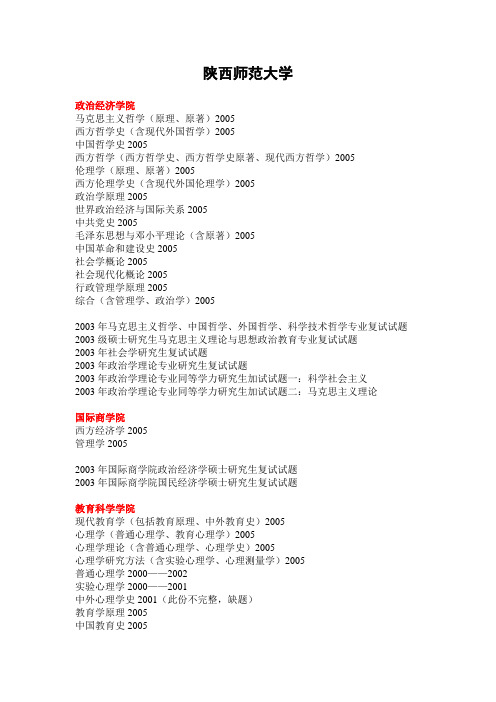
陕西师范大学政治经济学院马克思主义哲学(原理、原著)2005西方哲学史(含现代外国哲学)2005中国哲学史2005西方哲学(西方哲学史、西方哲学史原著、现代西方哲学)2005伦理学(原理、原著)2005西方伦理学史(含现代外国伦理学)2005政治学原理2005世界政治经济与国际关系2005中共党史2005毛泽东思想与邓小平理论(含原著)2005中国革命和建设史2005社会学概论2005社会现代化概论2005行政管理学原理2005综合(含管理学、政治学)20052003年马克思主义哲学、中国哲学、外国哲学、科学技术哲学专业复试试题2003级硕士研究生马克思主义理论与思想政治教育专业复试试题2003年社会学研究生复试试题2003年政治学理论专业研究生复试试题2003年政治学理论专业同等学力研究生加试试题一:科学社会主义2003年政治学理论专业同等学力研究生加试试题二:马克思主义理论国际商学院西方经济学2005管理学20052003年国际商学院政治经济学硕士研究生复试试题2003年国际商学院国民经济学硕士研究生复试试题教育科学学院现代教育学(包括教育原理、中外教育史)2005心理学(普通心理学、教育心理学)2005心理学理论(含普通心理学、心理学史)2005心理学研究方法(含实验心理学、心理测量学)2005普通心理学2000——2002实验心理学2000——2001中外心理学史2001(此份不完整,缺题)教育学原理2005中国教育史2005外国教育史2005教育心理学2005学前教育学2005教育管理学2005社会心理学(含普通心理学)2005普通教育学(包括教育管理)2005中外教育史(包括普通心理学)2005课程与教学论(现代教学论)专业2003硕士研究生复试试题教育学原理专业2003硕士研究生复试试题教育硕士(教育管理)专业2003硕士研究生复试试题教育史专业2003硕士研究生复试试题教育经济与管理专业2003硕士研究生复试试题基础心理学专业2003硕士研究生复试试题教育经济与管理专业2003硕士研究生(同等学力考生)加试《普通心理学、教育管理学》试题教育经济与管理专业2003硕士研究生(同等学力考生)加试《教育学》试题新闻与传播学院教育技术学(含教学设计)2005计算机网络(含程序设计)2005,2010(2010为回忆版)新闻传播理论与新闻史2005新闻业务(采、写、编、评、广播电视)2005新闻传播理论与历史2010(回忆版)新闻传播实务2010(回忆版)2003年教育技术学专业硕士生复试综合试题体育学院教育学2005运动生理学2005体育概论2005体育社会学基本理论2005运动生物化学2005运动训练学20052003年硕士研究生运动人体科学专业运动生理学复试试题2003年运动人体科学运动生物化学复试试题2003年研究生体育教育训练学专业《运动训练学》复试题2003年研究生体育教育训练学专业运动生理复试题2003年教育硕士《学校体育学》复试试题文学院文学综合(含中国古代文学、中国现当代文学、世界文学、文艺理论)2010(回忆版)语言综合(含古代汉语、现代汉语)2010(回忆版)美学原理2005中外美学史2005宗教学原理2005中外文化史2005教育学2005语文教学论2005文学理论2005中外文学史(中国部分只考古代,外国部分全部)2005语言学概论2005现代汉语2002,2005(其中2002年试卷内容不完整)中国播音学2005综合考试(新闻理论、语言学、语法)2005古代汉语(汉语言文字学专业)2005古代汉语(中国古代文学专业)2005古典文献学2005中国古代文学与古代汉语2005中国古代文学史2005中国现当代文学2005文学理论与外国文学2005文学理论(含比较文学理论)2005中国文学2005文学理论与比较文学2005世界文学2005现代文学2003当代文学2003文艺理论2003外国文学2003先秦两汉六朝文学2001文化理论2001中西哲学史2001,2010(2010为回忆版)文史哲经典文献知识2001元明清文学20012003年比较文学与世界文学硕士研究生同等学力加试考题2003年比较文学与世界文学硕士研究生专业课世界文学复试(笔试)考题2003年中国古典文献学专业研究生复试试题2003年硕士研究生语文教学论复试试卷2003年汉语言文字学专业硕士研究生复试题2003年语言学与应用语言学专业语言学概论专业复试题2003年文艺学专业复试试题2003年中国古代文学专业复试试题2003年中国古代文学专业同等学力加试试题一2003年中国古代文学专业同等学力加试试题二2003年硕士研究生复试《美学》专业试题2003年硕士研究生复试同等学力《美学》专业加试试题一2003年硕士研究生复试同等学力《美学》专业加试试题二2003年中国现当代文学专业硕士研究生复试题(笔试)外语学院二外日语2005——2006二外法语2005二外俄语2005二外德语2005专业英语(教育硕士专业)2005基础英语(教育硕士专业)2005基础英语(英语语言文学、外国语言学及应用语言学专业)2005综合课A(语言学、教学法、英汉互译)2006综合课A(英美文学、西方文化、英汉互译)2005综合课B(语言学、英语教学法)2005教育学20052003年外国语言学及应用语言学硕士研究生入学考试复试试题2003年英语教育硕士复试试题艺术学院教育学2005音乐教育学2005中外音乐史2005中外声乐史2005音乐分析及和声复调2005中国古代音乐文献2005中外舞蹈史2005舞蹈教学法(包括芭蕾教学法、中国民间舞教学法、中国古典舞教学法)2005 中外美术史2005中国画历代名作评析2005美术评论(名家名作评析:中国近现代部分、外国近代部分)2005艺术设计史2005设计作品分析2005美学原理新编20052003年攻读音乐学硕士学位研究生复试题民族器乐理论与演奏(陕西秦筝乐派)2003年攻读音乐学硕士学位研究生复试题音乐教育学(声乐艺术)2003年攻读音乐学硕士学位研究生复试题音乐教育学(中国古代音乐文献)环发中心中国通史2005中国自然地理2005中国地理学史20052003年历史地理专业硕士生入学复试试题西北民族中心民族学概论2005中国民族史2005艺术学概论20052003年中国少数民族史专业硕士研究生复试试题(综合)2003年中国少数民族史专业硕士研究生(同等学力)加试试题历史文化学院中国古代史(考古学及博物馆学专业)2005中国考古学2005中国古代史(史学类各专业)2004——2005古汉语与古文献知识2005历史文选2005中国近现代史2005世界通史2005世界近现代史2005古籍知识2003年复试试题中国古代史2003年复试试题文化史、思想史、经济史2003年复试试题历史学概论2003年复试试题中国古代文化史综合题2003年复试试题世界史2003年复试试题数学与信息科学学院教育学2005数学分析与高等代数2005数学分析2003,2005(答案有:2003)高等代数2005——2006数科院2003年研究生各专业复试试题物理学与信息技术学院教育学2005普通物理(力学、电磁学部分)2005高等数学(微积分与线性代数)2005热力学、统计物理2005量子力学(凝聚态物理、生物物理学专业)2005量子力学(光学专业)2005普通物理2005电磁学2005普通生物学2005物理学2005生物化学2005细胞生物学2005光学2005综合课(微机原理、C程序设计)20052003年光学、光学工程、天体物理专业硕士生复试试题(量子力学)2003年课程与教学论(物理)研究生入学复试《物理教学论》试题2003年声学专业硕士生复试《理论力学》试题化学与材料科学学院教育学2005化学教学论2005物理化学(含结构化学)2005分析化学(含仪器分析)2005有机化学2005普通物理2005普通化学20052003年硕士研究生复试无机化学试题2003年分析化学专业硕士研究生复试试题2003年硕士研究生复试物理化学试题2003年硕士研究生复试有机化学试题旅游与环境学院教育学2005中国地理(含自然地理和人文地理)2005高等数学2005自然地理学2005人文地理学2005地理信息系统2005环境学概论2005地貌学2005生态学2005旅游学(含旅游管理学、旅游资源与开发)20052003年自然地理专业硕士入学复试题2003年人文地理硕士复试《旅游资源学》笔试题2003地图学与地理信息系统专业《遥感与地图学》试题2003年旅游管理专业研究生面试试题2003年环境科学专业硕士生入学复试题2003年(地理)教育硕士复试题生命科学学院教育学2005生物教学论2005植物学2005生物化学2005动物学2005细胞生物学2005动物生理学2005普通生物学2005生态学20052003生科院研究生各专业复试细胞生物学试题2003生物课程与教学论硕士研究生复试试题食品工程系高等数学2005食品微生物学20052003年食品工程系硕士复试考试题(果品蔬菜加工学试题)2003年食品科学专业同等学力考生加试试题一:食品工程原理2003年食品科学专业同等学力考生加试试题二:营养与食品卫生学计算机科学学院高等数学2005数据结构20052003年硕士生入学复试数据结构试题继续教育学院现代教育学(包括教育原理、中外教育史)2005成人教育学(成人教育学、成人教育管理学)2005新闻出版科学研究所(学报)传播学(传播学理论、编辑出版学)2005综合课(新闻学原理含中国编辑出版史)2005。
英语专业考研真题集锦
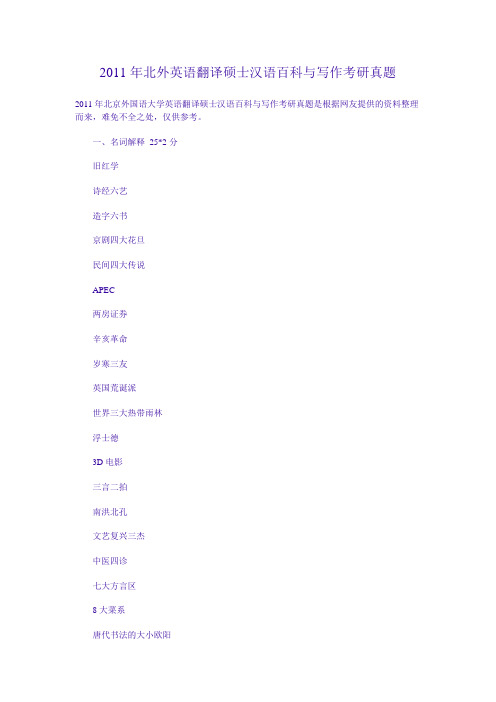
2011年北外英语翻译硕士汉语百科与写作考研真题2011年北京外国语大学英语翻译硕士汉语百科与写作考研真题是根据网友提供的资料整理而来,难免不全之处,仅供参考。
一、名词解释25*2分旧红学诗经六艺造字六书京剧四大花旦民间四大传说APEC两房证券辛亥革命岁寒三友英国荒诞派世界三大热带雨林浮士德3D电影三言二拍南洪北孔文艺复兴三杰中医四诊七大方言区8大菜系唐代书法的大小欧阳五音古印度两大史诗西方四大通讯社二、应用文写作40分北京日报社为了提高青年记者水平,拟选派10名记者于北京外国语大学英语学院进行脱产学习,时间从2011年3月至2012年2月。
请以北京日报社人事处的名义向北京外国语大学教务处发函,希望取得同意。
要求:按函的公文格式写作,400字以内,其它需要的信息可自行补充。
三、大作文60分韬略思想博大精深,源远流长。
在战国中期,有很多韬略代表人物,韬略的事例也很丰富。
(介绍了韬略学说与思想在中国的影响和地位,但并未提及韬略思想的内涵)以论韬略为题,写一篇议论文,阐述自己对韬略的见解和认识,不少于800字。
2011年南京师大外国语言文学基础与汉语写作考研真题2011年南京师范大学外国语言文学基础与汉语写作考研真题是根据网友提供的资料整理而来,难免不全之处,仅供参考。
名词解释:1、语义特征2、述事话语3、成分分析法问题回答:1、画出语义三角并说明意义和指称的关系2、阐述韩礼德的语域理论3、简述二语习得中产生的个体差异以及在教学中的应用4、克拉什的输入假设并评价汉语写作:根深与叶茂1000字左右2011年北京语言大学英语语言文学综合考研真题2011年北京语言大学英语语言文学综合考研真题是根据网友提供的资料整理而来,难免不全之处,仅供参考。
二外日语1.汉字写假名发音,学生,先生,花见之类超简单基础20*0.52.假名写汉字一个句子里写两三个假名,京都,红叶,子供,仕事,休憩时间之类也好简单基础。
20*0.53.外来语翻译超市,滑雪,日历……太基础了10*14.在句子中填助词都很基础常见10*15.选择20*1 基础语法6.翻译句子,汉译日,都是简单句:10*2星期六下午去看音乐会吗?森先生明天搬家吗?7.一段日语译成汉语。
陕师大英语考研

I.Define the following lingguistic terms(15points) 1,complimentary distribution 2,backformation 3,metonymy 4,phrase struture rules 4,communicative competenceII.Briefly answer the following questions (25points) 1,In what ways is competence an important distinction in modern linguistics? 2,What is the basic syllable structure found in English? 3,What word-formation processes are involveld in the creation of the italicized forms? (i)SARS is an epidemic which affects our lungs.(ii)The negotiators bluprinted a new peace proposal.4,What is the basic lexical relation between the following pairs of words? (i)bed furniture______ (ii)meat meet ______ (iii)mature ripe_____(iv)present absent______(v)head as a body part, head of an institution______ 5,Identify in the following sentence four bound morphemes.State whether each is derivational or inflectional.The teacher’s sister considered the project impossible.III.Explain the oddness of the following two sentences. (20points) (i)Colorless green ideas sleep furiously.(ii)我的纯种中国猫正在学习语言学。
陕西师范大学免费师范教育硕士英语试题及答案
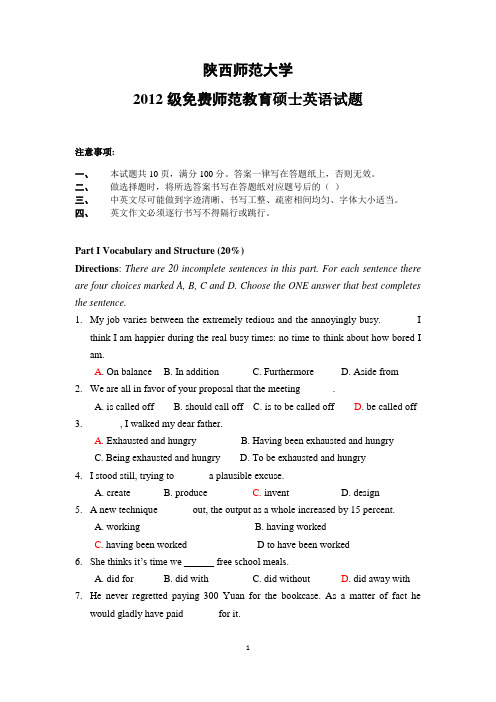
陕西师范大学2012级免费师范教育硕士英语试题注意事项:一、本试题共10页,满分100分。
答案一律写在答题纸上,否则无效。
二、做选择题时,将所选答案书写在答题纸对应题号后的()三、中英文尽可能做到字迹清晰、书写工整、疏密相间均匀、字体大小适当。
四、英文作文必须逐行书写不得隔行或跳行。
Part I Vocabulary and Structure (20%)Directions: There are 20 incomplete sentences in this part. For each sentence there are four choices marked A, B, C and D. Choose the ONE answer that best completes the sentence.1.My job varies between the extremely tedious and the annoyingly busy. ______ Ithink I am happier during the real busy times: no time to think about how bored I am.A. On balanceB. In additionC. FurthermoreD. Aside from2.We are all in favor of your proposal that the meeting ______.A. is called offB. should call offC. is to be called offD. be called off3.______, I walked my dear father.A. Exhausted and hungryB. Having been exhausted and hungryC. Being exhausted and hungryD. To be exhausted and hungry4.I stood still, trying to ______ a plausible excuse.A. createB. produceC. inventD. design5. A new technique ______ out, the output as a whole increased by 15 percent.A. workingB. having workedC. having been worked D to have been worked6.She thinks it’s time we ______ free school meals.A. did forB. did withC. did withoutD. did away with7.He never regretted paying 300 Yuan for the bookcase. As a matter of fact hewould gladly have paid ______ for it.A. as much twiceB. twice as muchC. much as twice D as twice much8.He was attending a meeting, ______ come to your birthday party then.A. unless he would haveB. or he wouldC. nevertheless he did not D or he would have9.He ______ the job ______ because it involved too much traveling.A. turned…downB. turned…awayC. turned off D turned…over10. They have made changes in their plans for a new science park as you .A. suggestedB. have suggestedC. had suggestedD. suggest 11.In some areas of northwest China, intensive farming has brought about severe_____ of the land, which accounted for poor harvest in recent years.A. deforestationB. dejectionC. delectation D degeneration12.The accuracy of scientific observations and calculations is always_____ the scientist’s time-keeping methods.A. at the mercy ofB. in accordance withC. under the guidance ofD. by means of 13.Manufacturers raised the price of this product to ______ the increased cost of material.A. write offB. offsetC. make forD. abstain from14.Among other things was the discussion to reach a_______ trade agreement between the two countries.A. reciprocalB. mergedC. marketableD. mature15.Nowadays more Chinese would like to hold their reunion dinner in posh restaurants, despite the______ costs. They find it more enjoyable and physically less demanding.A. hyperbolicB. inexorableC. exorbitantD. protean16. Christmas is a Christian holy day usually celebrated on December 25th_______the birth of Jesus Christ.A. in accordance withB. in terms ofC. in favor ofD. in honor of17. The _________ to overthrow the revolutionary regime was unearthed andpromptly smashed.A. conspiracyB. trickC. intrigueD. plot18. In the last couple of days, a number of areas in China were hit by heavy snowfalls,powerful winds or suffocating sandstorms. The extremely bad weather has________ the transportation system in the areas.A. constrainedB. cussedC. crippledD. chucked19. My father is researching the spread of AIDs. And he is ________ in hispresentation of experiments.A. relevantB. sacredC. proteanD. meticulous20. Mr. John made a very wonderful after-dinner speech. His ________ mind,graceful manner and fluent words moved all the participants deeply.A. awesomeB. articulateC. agileD. arbitraryPart II Reading Comprehension (40%)Directions: There are 4 passages in this part. Each passage is followed by five questions or unfinished statements. For each of them there are four choices marked A, B, C and D. You should decide on the best choice.Passage OneWhen your parents advise you to "get an education" in order to raise your income, they tell you only half the truth. What they really mean is to get just enough education to provide manpower for your society, but not so much that you prove an embarrassment to your society.Get a high school diploma, at least. Without that, you will be occupationally dead unless your name happens to be George Bernard Shaw or Thomas Alva Edison, and you can successfully dropout in grade school.Get a college degree, if possible. With a B.A., you are on the launching pad. But now you have to start to put on the brakes. If you go for a master's degree, make sure it is an M.B.A., and is famous.Do you know, for instance, that long-haul truck drivers earn more per year than full professors? Yes, the average 1977 salary for those truckers was $24000 while the full professors managed to earn just $23030.A Ph.D. is the highest degree you can get. Except for a few specialized fields such as physics or chemistry where the degree can quickly be turned to industrial or commercial purposes, if you pursue such a degree in any other field, you will face a dim future. There are more Ph.D.s unemployed or underemployed in this country than any other part of the world.If you become a doctor of philosophy in English or history or anthropology or political science or languages or worst of all in philosophy, you run the risk of becoming overeducated for our national demands. Not for our needs, mind you, but for our demands.Thousands of Ph.D.s are selling shoes, driving cars, waiting on table, and endlessly filling out applications month after month. They may also take a job in some high school or backwater college that pays much less than the janitor earns.You can equate the level of income with the level of education only so far. Far enough, that is, to make you useful to the gross national product, but not so far that nobody can turn much of a profit on you.21. According to the writer, what the society expects of education is to turn out peoplewho _____.A. will not be a disgrace to societyB. will become loyal citizensC. can take care of themselvesD. can meet the nation's demands as a sourceof manpower22. Many Ph.D.s are out of job because _____.A. they are improperly educatedB. they are of little commercial value to their societyC. there are fewer jobs in high schoolsD. they prefer easier jobs that make more money23. The nation is only interested in people _____.A. with diplomasB. who specialize in physics and chemistryC. who are valuable to the gross national productD. both A and C24. Which of the following is not true?______A. Bernard Shaw didn't finish high schools, nor did Edison.B. One must think carefully before pursuing a master degree.C. The higher your education level, the more money you will earn.D. If you are too well-educated, you'll be overeducated for society's demands.25. The writer sees education as _____.A. a means of providing job security and financial security and a means ofmeeting a country's demands for technical workersB. a way to broaden one's horizonsC. more important than finding a jobD. an opportunity that everyone should havePassage TwoIn the mid-nineteenth century, the United States had tremendous natural resources that could be exploited in order to develop heavy industry. Most of the raw materials that are valuable in the manufacture of machinery, transportation facilities, and consumer goods lay ready to be worked into wealth. Iron, coal, and oil —the basic ingredients of industrial growth —were plentiful and needed only the application of technical expertise, organizational skill, and labor.One crucial development in this movement toward industrialization was the growth of the railroads. The railway network expanded rapidly until the railroad map of the United States looked like a spider’s web, with the steel filaments connecting all important sources of raw materials, their places of manufacture, and their centers of distribution. The railroads contributed to the industrial growth not only by connecting these major centers, but also by themselves consuming enormous amounts of fuel, iron, and coal.Many factors influenced emerging modes of production. For example, machine tools, the tools used to make goods, were steadily improved in the latter part of the nineteenth century — always with an eye to speedier production and lower unit costs. The products of the factories were rapidly absorbed by the growing cities that sheltered the workers and distributors. The increased urban population was nourished by the increased farm production that, in turn, was made more productive by the use of the new farm machinery. American agricultural production kept up with the urban demand and still had surpluses for sale to the industrial centers of Europe.The labor that ran the factories and built the railways was recruited in part from American farm areas where people were being displaced by farm machinery, in part from Asia, and in part form Europe. Europe now began to send tides of immigrants from eastern and southern Europe — most of whom were originally poor farmers but who settled in American industrial cities. The money to finance this tremendous expansion of the American economy still came from European financiers for the most part, but the Americans were approaching the day when their expansion could be financed in their own “money market”.26. What does the passage mainly discuss?A. The history of railroads in the United States.B. The major United States industrial centers.C. Factors that affected industrialization in the United States.D. The role of agriculture in the nineteenth century.27. The word “ingredients” in the first paragraph is closest in meaning to ________.A. mineralsB. productsC. methodsD. components28. According to the passage, all of the following were true of railroads in the UnitedStates in the nineteenth century EXCEPT that ________.A. they connected important industrial citiesB. they were necessary to the industrialization processC. they were expanded in a short timeD. they used relatively small quantities of natural resources29. According to the passage, what was one effect of the improvement of machine tools?A. Lower manufacturing costs.B. Better distribution of goods.C. More efficient transportation of natural resources.D. A reduction in industrial jobs.30. Which of the following is NOT true of the United States farmers in the nineteenthcentury?A. They lost some jobs because of mechanization.B. They were unable to produce sufficient food for urban areas.C. They raised their productivity by using new machinery.D. They sold food to European countries.Passage ThreeSince the dawn of human ingenuity, people have devised ever more cunning tools to cope with work that is dangerous, boring, burdensome, or just plain nasty. That compulsion has resulted in robotics—the science of conferring various human capabilities on machines. And if scientists have yet to create the mechanical version of science fiction, they have begun to come close.As a result, the modern world is increasingly populated by intelligent gizmos whose presence we barely notice but whose universal existence has removed much human labor. Our factories hum to the rhythm of robot assembly arms. Our banking is done at automated teller terminals that thank us with mechanical politeness for the transaction. Our subway trains are controlled by tireless robot-drivers. And thanks to the continual miniaturization of electronics and micro-mechanics, there are already robot systems that can perform some kinds of brain and bone surgery with submillimeter accuracy—far greater precision than highly skilled physicians can achieve with their hands alone.But if robots are to reach the next stage of laborsaving utility, they will have to operate with less human supervision and be able to make at least a few decisions for themselves -- goals that pose a real challenge. “While w e know how to tell a robot to handle a specific error,” says Dave Lavery, manager of a robotics program at NASA, “we can’t yet give a robot enough ‘common sense’ to reliably interact with a dynamic world.”Indeed the quest for true artificial intelligence has produced very mixed results. Despite a spell of initial optimism in the 1960s and 1970s when it appeared that transistor circuits and microprocessors might be able to copy the action of the human brain by the year 2010, researchers lately have begun to extend that forecast by decades if not centuries.What they found, in attempting to model thought, is that the human brain’s roughly one hundred billion nerve cells are much more talented—and human perception far more complicated —than previously imagined. They have built robots that can recognize the error of a machine panel by a fraction of a millimeter in a controlled factory environment. But the human mind can glimpse a rapidly changing scene and immediately disregard the 98 percent that is irrelevant, instantaneously focusing on the monkey at the side of a winding forest road or the single suspiciousface in a big crowd. The most advanced computer systems on Earth can’t approach that kind of ability, and neuroscientists still don’t know quite how we do it.31. Human ingenuity was initially demonstrated in ________.A. the use of machines to produce science fictionB. the wide use of machines in manufacturing industryC. t he invention of tools for difficult and dangerous workD. the elite’s cunning tackl ing of dangerous and boring work32. The word “gizmos” (Line 1, Paragraph 2) most probably means________.A. programsB. expertsC. devicesD. creatures33. According to the text, what is beyond man’s ability now is to design a robot thatcan ________.A. fulfill delicate tasks like performing brain surgeryB. interact with human beings verballyC. have a little common senseD. respond independently to a changing world34 Besides reducing human labor, robots can also________.A. make a few decisions for themselvesB. deal with some errors with human interventionC. improve factory environmentsD. cultivate human creativity35. The author uses the example of a monkey to argue that robots are________.A. expected to copy human brain in internal structureB. able to perceive abnormalities immediatelyC. far less able than human brain in focusing on relevant informationD. best used in a controlled environmentPassage FourThough it is mere 1 to 3 percent of the population, the upper class possesses at least 25 percent of the nation’s wealth. This class has two segments: upper-upper and lower-upper. Basically, the upper-upper class is “old rich” -families that have been wealthy for several generations -an aristocracy of birth and wealth. Their names are in the Social Register, a listing of acceptable members of high society. A few are known across the nations, such as the Rockefellers, Roosevelts, and Vanderbilts. Mostare not visible to the general public. They live in grand seclusion, drawing their income from the investment of their inherited wealth. In contrast, the lower-upper class is the “new rich”. Although they may be wealthier than some of the old rich, the new rich have hustled to make their money like everybody else beneath their class. Thus their prestige is generally lower than that of the old rich, who have not found it necessary to lift a finger to make their money, and who tend to look down upon the new rich.However its wealth is required, the upper class is very, very rich. They have enough money and leisure time to cultivate an interest in the arts and to collect rare books, paintings, and sculptures. They generally live in exclusive areas, belong to exclusive social club, communicate with each other, and marry their own kind -all of which keeps them so distant from the masses that they have been called the out-of-sight class. More than any other class, they tend to be conscious of being members of a class. They also command an enormous amount of power and influence here and abroad, as they hold many top government positions, run the Council on Foreign Relations, and control multinational corporations. Their actions affect the lives of millions.36 All the following statements are true EXCEPT that ______.A. the upper-upper class is of aristocratic originB. the “old rich” enjoy higher prestige than the “new rich”C. t he “old rich” isolate themselves and lead a lonely lifeD. the upper class owns at least a quarter of the country’s wealth37. According to the author, th e “old rich” get richer ______.A. through the Social RegisterB. through their reputationC. by investing their inherited wealthD. by collecting paintings and sculptures38. The reason why the “old rich” look down upon the “new rich” is that ______.A. the former are wealthier than the latterB. the latter sweat themselves to make moneyC. the “new rich” have no interest in artsD. the “old rich” are conscious of being members of the upper class39. The upper class is also called the out-of-sight class because ______.A. they keep away from the general publicB. they spend most of their time abroadC. they don’t communicate with any peopleD. they move frequently from place to place40 We can learn from the passage that ______.A .the upper class is powerful and influentialB. the upper class collects rare books to make moneyC. the upper class holds all top government positionsD. the “old rich” makes much more money than the “new rich”Part III Writing (40%)Directions: Write an essay of 160-200 words based on the following drawing. In your essay, you should1)describe the drawing briefly,2)explain its intended meaning, and then3)give your comments.You should write neatly on your ANSWER SHEET. Remember to give a title to your writing.Penguins Need Room to SurviveAs is vividly depicted in the drawing, Antarctica is being exploited by a series of countries, like the United States, the United Kingdom and Australia. The poor penuins,the original residents, have no way but to flee away. By depicting this image, the drawer attempts to expose the current living situation of penguins there and admonish people to leave room for penguins to live in.As known to all, Antarctica is the home of penguins. It is also widely described as the last true wilderness on our planet. However, Antarctica has more recently been playing host to adventurers seeking excitement, scientists interested in experimenting, and companies looking to exploit this wild terrain for profit. Yet, Antarctica's fragile and complicated eco-system is threatened by its human visitors. Damage to the environment occurs as people come looking for resources beneath the ice. What human beings have done there is threatening the survival of penguins. Experts say as many as ten of the seventeen kinds of penguins may be in danger of disappearing. In addition, widespread fishing, exploration for oil and oil leaks also threaten penguins.All in all, people have to take action to help the birds with concentrated attention, then penguins may have chance to live on with us. People from all countries have to ensure that the damage to Antarctica's environment is minimized, and that the last wilderness on earth will remain an unspoiled place. Thus, penguins will have room to survive.2012级免费师范教育硕士英语试题答题纸学院_________________ 学号____________________姓名_________________ 成绩_____________________注意事项一、本试题共10页,满分100分。
英语专业考研真题
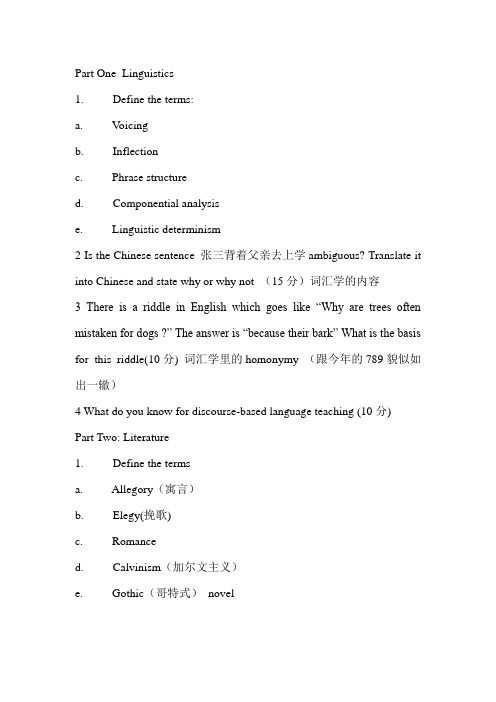
Part One Linguistics1. Define the terms:a. V oicingb. Inflectionc. Phrase structured. Componential analysise. Linguistic determinism2 Is the Chinese sentence 张三背着父亲去上学ambiguous? Translate it into Chinese and state why or why not (15分)词汇学的内容3 There is a riddle in English which goes like “Why are trees often mistaken for dogs ?” The answer is “because their bark” What is the basis for this riddle(10分) 词汇学里的homonymy (跟今年的789貌似如出一辙)4 What do you know for discourse-based language teaching (10分)Part Two: Literature1. Define the termsa. Allegory(寓言)b. Elegy(挽歌)c. Romanced. Calvinism(加尔文主义)e. Gothic(哥特式)novel2. Answer the questionsa. Why is William Blake called a pre-romantic or forerunner of the Romantic poetry of the 19th century in English literatureb. How many odes did John Keats write in his life? What are they?c. What is the significance of American Puritanism in American literature?d. What is the major theme in Rip V an Winkle by Washington Irving3. Comment on One of the three in at least 200 wordsa. I wonder lonely as a Cloudb. My Last Duchessc. The fall of House of UsherPart Three Translation1. 英翻汉From watching westerners attempting to work in China, I must conclude that Chinese and westerners are not the same. We and they think differently. Westerners think in prose each sentence or paragraph following from the preceding. Chinese think in poetry, where context or settings determines action.Western thinking is linear, moving from goals to strategy to tactics, or from overview to details (or the reverse). Chinese put everything in a big pot, stir well and serve whatever comes up. Discussion of philosophical goal may be followed by a question on how same minor component willbe shipped.In negotiation and other relationships, Americans and Chinese both usually lack sufficient information and cultural background to communicate well with each other. Chinese businessmen tend to have business negotiations in rather indirect manner, as opposed to the more direct manner of American businessman. The Chinese like to take time to learn whether their prospective business contacts are really reliable (没有生词,看到后心里爽了一大截)2. 汉翻英有人做过这样的语言,如果地球上有一天断了烟,天下可能会大乱。
2012年陕西师范大学333教育综合[专业硕士]考研真题及详解[视频讲解]【圣才出品】
![2012年陕西师范大学333教育综合[专业硕士]考研真题及详解[视频讲解]【圣才出品】](https://img.taocdn.com/s3/m/ea3c4c5d700abb68a982fbe5.png)
2012年陕西师范大学333教育综合[专业硕士]考研真题及详解[视频讲解]一、名词解释1.最近发展区答:维果茨基认为,在进行教学时,必须注意到儿童有两种发展水平:一种是儿童的现有发展水平;另一种是即将达到的发展水平。
维果茨基把两种水平之间的差异称为“最近发展区”,即独立解决问题的真实发展水平和在成人指导下或与其他儿童合作情况下解决问题的潜在发展水平之间的差距。
维果茨基认为,弄清楚儿童发展的两种水平,即最近发展区,将会大大提高教学对儿童心理发展的作用。
2.学制答:学制指学校教育制度,亦称“学校系统”。
它是指一个国家各级各类学校的系统,它规定各级各类学校的性质、任务、入学条件、修业年限以及它们之间的关系。
按教育程度划分,有幼儿教育、初等教育、中等教育、高等教育机构;按教育类型划分,有普通教育、专业教育等教育机构;按受教育的时间划分,有全日制、半日制、业余教育等机构;按主要教育手段和场所划分,有面授、函授、巡回、广播、电视等教育机构;按教育对象的年龄划分,有学龄期教育、成人教育机构;按主办单位划分,有国家办、地方办、企事业办和私人办的教育机构,组成了一个纵横交叉的学校教育网。
3.研究性学习答:研究性学习主要与传统的接受性学习相对。
研究性学习是指在教学过程中创设一种类似科学研究的情境或途径,让学生在教师引导下,从学习、生活及社会生活中去选择和确定研究专题,用类似科学研究的方式,主动地去探索、发现和体验。
研究性学习能够使学生充分调动学生的积极性,发挥主动性,有助于问题的解决。
一般来讲,凡是学生通过自己亲身参与的实践活动获取知识、得出结论、形成产品,而不是由教师将现成的知识、结论通过传递式教学直接教给学生的学习方式,都属于研究性学习。
4.建构主义教学理论答:建构主义是认知结构学习理论在当代的发展,它强调学生的巨大潜能,认为教学要把学生现有的知识经验作为新知识的生长点,引导他们从原有的知识经验中“生长”出新的知识经验。
2012年陕西师范大学考研教育硕士(Ed.M)教育综合真题试卷(题后含答
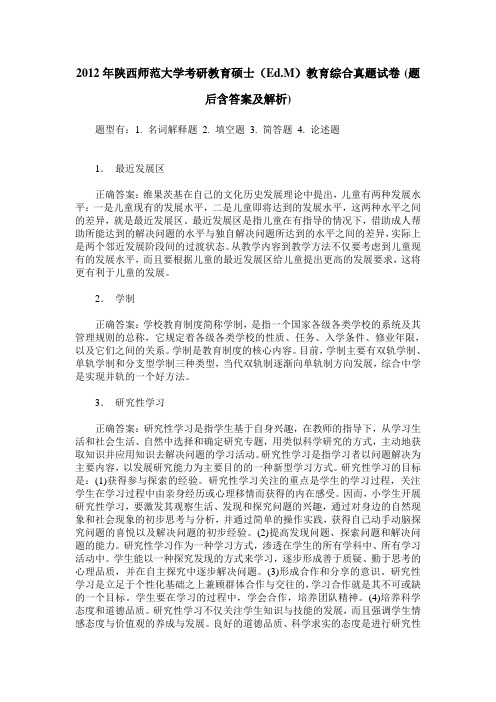
2012年陕西师范大学考研教育硕士(Ed.M)教育综合真题试卷(题后含答案及解析)题型有:1. 名词解释题 2. 填空题 3. 简答题 4. 论述题1.最近发展区正确答案:维果茨基在自己的文化历史发展理论中提出,儿童有两种发展水平:一是儿童现有的发展水平,二是儿童即将达到的发展水平,这两种水平之间的差异,就是最近发展区。
最近发展区是指儿童在有指导的情况下,借助成人帮助所能达到的解决问题的水平与独自解决问题所达到的水平之间的差异,实际上是两个邻近发展阶段间的过渡状态。
从教学内容到教学方法不仅要考虑到儿童现有的发展水平,而且要根据儿童的最近发展区给儿童提出更高的发展要求,这将更有利于儿童的发展。
2.学制正确答案:学校教育制度简称学制,是指一个国家各级各类学校的系统及其管理规则的总称,它规定着各级各类学校的性质、任务、入学条件、修业年限,以及它们之间的关系。
学制是教育制度的核心内容。
目前,学制主要有双轨学制、单轨学制和分支型学制三种类型,当代双轨制逐渐向单轨制方向发展,综合中学是实现并轨的一个好方法。
3.研究性学习正确答案:研究性学习是指学生基于自身兴趣,在教师的指导下,从学习生活和社会生活、自然中选择和确定研究专题,用类似科学研究的方式,主动地获取知识并应用知识去解决问题的学习活动。
研究性学习是指学习者以问题解决为主要内容,以发展研究能力为主要目的的一种新型学习方式。
研究性学习的目标是:(1)获得参与探索的经验。
研究性学习关注的重点是学生的学习过程,关注学生在学习过程中由亲身经历或心理移情而获得的内在感受。
因而,小学生开展研究性学习,要激发其观察生活、发现和探究问题的兴趣,通过对身边的自然现象和社会现象的初步思考与分析,并通过简单的操作实践,获得自己动手动脑探究问题的喜悦以及解决问题的初步经验。
(2)提高发现问题、探索问题和解决问题的能力。
研究性学习作为一种学习方式,渗透在学生的所有学科中、所有学习活动中。
- 1、下载文档前请自行甄别文档内容的完整性,平台不提供额外的编辑、内容补充、找答案等附加服务。
- 2、"仅部分预览"的文档,不可在线预览部分如存在完整性等问题,可反馈申请退款(可完整预览的文档不适用该条件!)。
- 3、如文档侵犯您的权益,请联系客服反馈,我们会尽快为您处理(人工客服工作时间:9:00-18:30)。
陕师大2012英语专业考研专业课真题(含二外)(回忆版)
专业课(语言学文学)
语言学方面(75分)
名词解释
1. assimilation rules
2. bound morpheme
3. connotative meaning
4. euphemism
5. task-based instruction(teaching method)
简答题
1. 解释minimal pairs,并举例,说明其在phonology study中的重要性
2. 歧义分析并且附上树形分析图①The sheepdog is too hairy to eat ②burning grass is dangerous
3. 分析小短文写个comment, 有两段,第一段是将作者从教之后的教学手段从少到多变化,以及现代教学手段的多样。
第二段是说自己曾经被别人告知以前学的法语对英语教学没帮助,现在才明白其实什么语言都有用,(我个人觉得应该在comment中评价语言的相通性,所有的语言都有共同特性,作为老师应当博学,对英语的nature才能更了解,仅供参考,嘻嘻)小段
4. 一段文章翻译其中的4小段。
(个人觉得应该是韩礼德或者乔姆斯基或者某个语言学家自己写的语言研究记事,其中有语言学专业名称也带一点点文学小性质,总之翻的我很纠结呀,时间紧迫)
文学方面(75分)
名词解释
1. allegory
2. parody
3. fantasy
4.trochee (扬抑格)
5. stream of conscienciousness
简答
1. 说一下neoclaisscism 的文学特色,以及这个时期各种文ro体及代表人
2. Ronbinson crusoe为什么在自己的孤岛上刚开始讨厌想逃离,后来回到欧洲大陆以后又想回去?
3. 为什么惠特曼是American literature 的innovator
4. henry james 的realism 与mark twin 的realism有什么区别
评论四选一 1. VanityFair 2. My Last Duchess 3. Martin Eden 4. 永别了武器
(这是我能回忆起来的专业课真题了,请谅解,等想起来了再补充)
基础英语
1. 20个单选,有语法有词汇,语法类似专四难度但要小心,词汇一般不算太难
2. 10个改错,个人感觉和冲击波难度差不多,做的纠结的,痛苦
3. 阅读理解,4篇单选没有像去年传说中一样有多选。
最后一篇比较难
4. 翻译各20分
英译汉4个句子,①大概是美国声明,认同一个中国原则②忘了③忘了④好像是《高级英语》里面的一篇二战时期的文章摘的一句,大意是在阿根廷湾美军舰队等待丘吉尔的到来,大地,山,天空,水都是灰色的
汉译英就是梁秋实关于时间的散文中摘的,很基础没有技术性难词
5. 作文 Factors necessary to happiness 四百字
(题型变化,原本以为翻译在专业课里结果出到基础英语了)
二外:我的二外是德语,没有买过什么真题只是把自己的课本和陕师要求的课本都看了
1 30个选择题,很基础不难,词汇语法,好好看书就可以基本都作对
2 填空,①10个第二分词填空,只需填第二分词就可以真正不用你考虑时态语态②介词填空,常用介词及搭配10个。
3 改写句子①5个句子,将单句改写为从句。
②忘了
4 阅读理解,3篇,阅读本身没难度好懂,可是下面的选项比较费劲难懂,要小心。
5 翻译 5个德译汉5个汉译德,德译汉德难度和德语四级难度持平。
汉译德很基础,有两册书的功底就够了
6作文,150个词dein Leben
以上这些就是我能回忆起来的,希望对你们有帮助,有不对的欢迎指正和补充。
也希望god bless me。
